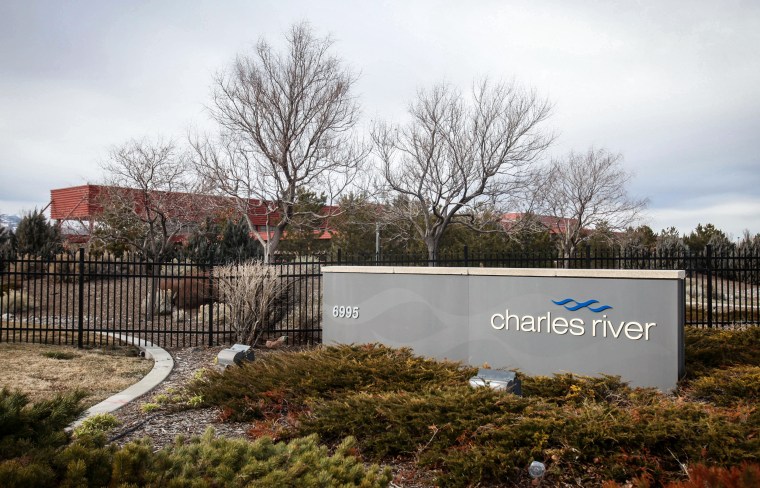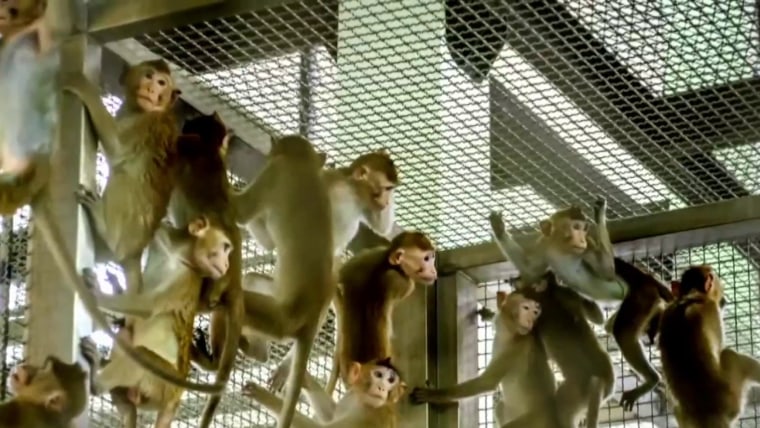Federal wildlife officials found themselves in a sticky situation after they flagged recent shipments of research monkeys as improperly imported into the US.
The more than 1,000 long-tailed macaques were imported by Charles River Laboratories, a Massachusetts-based research company.. Since they were tagged by wildlife officials, the monkeys have been in the company’s care, a spokesman for Charles River said.
In the past six months, US Fish and Wildlife Service officials have contacted at least two animal sanctuaries to inquire about the cost of housing and feeding the primates for the rest of their lives.
One sanctuary quoted a price tag of $125 million, to cover personnel costs, land purchases and construction infrastructure, before communication with government officials stalled last week.
The federal government then decided to send the monkeys back to Cambodia, according to PETA, but animal rights groups are fighting back.
“We know the monkeys won’t be safe at the other end,” said Liz Tyson, director of programs for Born Free USA, the organization that provided the $125 million listing for wildlife officials.
PETA Senior Vice President Kathy Guillermo said the group is urging Fish and Wildlife to «do the right thing and send these gentle beings to dignified and willing sanctuaries.»
It is not clear what led Fish and Wildlife to stop Charles River from using the overalls. An agency spokesman said the monkey shipments were denied clearance as a result of an ongoing investigation, but did not provide further details.
The importation of monkeys used in medical research is strictly regulated and requires documentation proving that the primates came from farms.
The Justice Department has been investigating for years whether US companies, including Charles River, were involved in smuggling monkeys poached from the wild and brought into the US with forged documents.

A spokesman for Charles River acknowledged that the Fish and Wildlife Service recently denied authorization to «several shipments» from the company’s Cambodian supplier.
“We have operated under the belief that all shipments of [monkeys] …satisfied with the material requirements, documentation, and related processes and procedures of CITES,” a 1975 treaty designed to ensure that the global trade in certain plants and animals does not threaten their survival in the wild.
The company said it voluntarily suspended future shipments of Cambodian monkeys «until we and the US Fish and Wildlife Service can develop and implement new procedures to bolster confidence that the [monkeys] we import from Cambodia are bred for a purpose.”
The company added that it «continues to care» for the Cambodian-origin monkeys, but did not specify the location.
Charles River announced in February that he had been subpoenaed in the Justice Department’s investigation.
“We are fully cooperating with the US government as part of its investigation and believe that any concerns raised regarding the Charles River are without merit,” the company said in a statement at the time.
Angela Grimes, executive director of Born Free USA, said Fish and Wildlife first contacted the organization in September. The agents were looking for a home for 360 monkeys.
Fish and Wildlife officials called again in February and said the number of monkeys had ballooned to 1,200, Grimes said.
“There is no place with room for 1,200 monkeys,” added Grimes. “The government was struggling with it. We were also struggling with that.»
Grimes said he hoped to work with the federal government to come up with a plan to get the funds needed to establish housing for the monkeys. But then he felt like the rug had been pulled out from under him when PETA announced that he had information suggesting the government planned to send the monkeys back to Cambodia.
“We weren’t given the full opportunity to have a serious conversation to come up with solutions that might possibly work,” Grimes said.
Krystal Mathis, executive director of Primarily Primates, a sanctuary outside San Antonio, said she received a call from Fish and Wildlife in February.
«It seemed that they [the agents] they were trying to figure out what all their options were,” Mathis said. «We said we could definitely take some of the females to start with, and maybe more as we learn additional information.»
Primates Primates and Born Free USA said a new structure to house a dozen rescued monkeys could cost more than $100,000. Animals also need daily feeding and frequent veterinary care that requires staff and resources.
On Monday, PETA supporters inundated the Fish and Wildlife Service with thousands of emails and phone calls urging the agency not to send the monkeys back to Cambodia, the group said.
Fish and Wildlife Service spokeswoman Laury Marshall declined to provide information about her plans for the monkeys.
«The disposition of shipments that are denied clearance varies depending on the circumstances, and we are unable to comment further on these shipments at this time,» Marshall said.
In November, two Cambodian wildlife officials were among eight people charged with running an international monkey smuggling ring that allegedly shipped primates to the US that had been poached from the wild and falsely labeled as coming from Cambodia. hatcheries.
Smuggling of wild-caught monkeys is believed to have been going on for decades due to the colossal demand for lab monkeys in the US and the limited supply at breeding facilities at home and abroad.
NBC News reported in December that the covid pandemic and the race to find a vaccine further squeezed the market, sparking a mad race for animals that fueled a surge in monkey poaching and contributed to endangering monkeys. species most commonly used in drug studies. – the long-tailed macaque.
“It got out of hand,” Malene Friis Hansen, director of the Long-tailed Macaque Project, a Denmark-based nonprofit group focused on primate conservation, said at the time.


